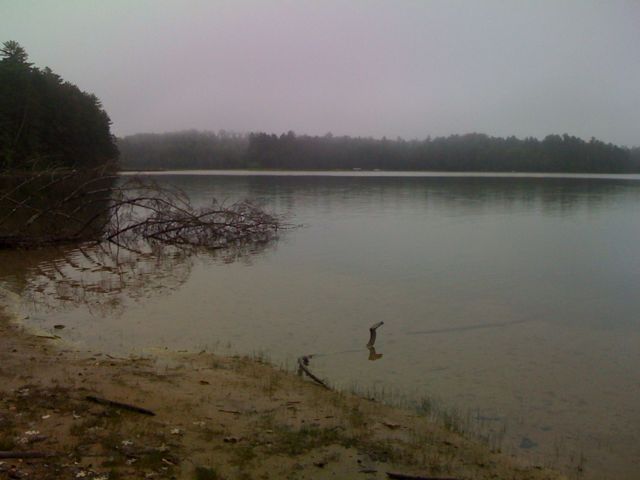Pat and I, along with 13 friends, are part of a group of 1stCongo folk helping out at Moon Beach camp in Vilas County, WI. the photo below shows the misty morning that greeted us yesterday; today is comparable. Even so, we accomplished a lot yesterday (Pat stacking wood and raking; Steve scraping and prepping for paint, assuming the weather dries out). We were serenaded by frogs in the bog upon arrival Sunday night, scolded by a pair of phoebes whose nest is on our cabin porch, and summoned from sleep this morming by the call of a loon. Blessings abound!
Author: Steve
Non-violence’s answer to the question, “What about Hitler?”
The rise of National Socialism and Hitler in post-WWI Germany has become for many the trump-card against non-violent approaches to resolving conflict. The man and the regime were so evil, the argument goes, and so resistant to reason and persuasion, that only a countervailing violence could have brought the evil to a halt and saved untold millions more lives.
(This conclusion is, of course, an example of the power of the myth of redemptive violence, illuminated forcefully in a 2006 essay by Walter Wink.)
Steve Thorngate, in an aside in a recent blog entry on Theolog, points us to a brief essay by Jørgen Johansen exploring the abundant opportunities that existed in the first three decades of the twentieth century to challenge and undermine the Nazis using non-violent means, and points out some of the successes that were achieved in this way.
Johansen identifies four factors that contributed to the rise of Hitler: The humiliation of Germany reflected in the Treaty of Versailles, the economic crises of the 1920s and 1930s, a prevailing racist ideology, and the “Culture of Prussian Obedience” that prevailed in the period. He explores how approaches different from those taken by the international community could have blunted or redirected the forces that National Socialism tapped.
He then points out some of the effective non-violent methods that were used within Germany and Axis countries by the resistance movements, noting that broader support of these movements from the Allies and neutral nations could have undermined the Nazi regime.
With Reinhold Niebuhr, a self-confessed “realist” in international relations, providing theological and moral foundations for much of the Obama administration’s foreign policy, it is good to be reminded that non-violent approaches are not only idealistic, they’re also profoundly realistic.
Economic Inequality and Social Division
Arts and Letters Daily links to a Boston Globe story on Kate Pickett and Richard Wilkinson’s UK book, The Spirit Level. The authors marshall persuasive evidence that in countries where income inequality is high, social conditions and general welfare suffer.
It is economic inequality, not overall wealth or cultural differences, that fosters societal breakdown, they argue, by boosting insecurity and anxiety, which leads to divisive prejudice between the classes, rampant consumerism, and all manner of mental and physical suffering.
The source of this anxiety, they argue, is status disparities and the inability of those of low means to achieve higher status. Ironically, their research shows that increasing wealth disparities lead to a more consumeristic society (and, we might add, increase the destructive pressure on that society):
We want bigger houses and more cars, not because we need them, but because we use them to express our status. Material goods are how we show the world we’re keeping up, and in a more hierarchical society that’s more important. Status competition becomes more intense, and that increases our need to consume.
A challenging and tempering thesis … if only we can heed the warning.
An opportunity in prison budget cuts?
The Christian Science Monitor editorial board offers a useful and well-reasoned defense of shrinking prison budgets, driven by states’ revenue shortfall, as an opportunity to rethink our approach to treatment and punishment.
The US ranks as the prison capital of the world. In 2008, more than 2.3 million men and women (or 1 in 100 adults) sat in prisons or jails. This dubious distinction comes from a near tripling of the inmate population over the past two decades – and a similar rise in state spending on corrections.
Drawing from the results of a recent study by The Pew Center on the States, the board notes that states can count on public support for rehabilitation, vocational training, and parole reform, while support for sentencing reform is weaker. Even so, the editorial concludes,
The states are imprisoned by their prison budgets. Economic necessity can unloose their chains with a different way of doing things.
The virtues that lead to recessions
Dierdre McCloskey, professor at the University of Illinois-Chicago, is a Harvard-educated economist who taught at the University of Chicago before moving north to UIC. She is the author of a theological defense of capitalism, The Bourgeois Virtues: Ethics for an Age of Commerce. Self-described as “a postmodern free-market quantitative rhetorical Episcopalian feminist Aristotelian woman who was once a man” and an “iconoclastic” economist, her thoughts on the sources of the current recession appear in a compilation in the July 28, 2009, Christian Century (p. 24). Her perspective: That recessions don’t come from greed but, rather, from risk and daring undertaken by fallible humans; and without the economic growth that has resulted from such risk and daring, the world’s poor would be much less well off.
The recessions do not come from greed …. The recessions come from hope and courage, from venturing on building railways and then overbuilding them; from founding dot-com companies, and the overfounding them; from innovating in financial services and then overinnovating. We go too far, as imperfect creatures with imperfect knowledge of the future …. But in the meantime we get better railways, computers, banks. That’s why the recovery is always greater than the decline. The trend has been startlingly upward, the second most important event in human history.
The jagged rise of innovation has been disturbing, but on balance it has been immensely good for the poorest among us ….
This is a writer and thinker whom I need to get to know better.
Choose a religion that fits your lifestyle and after-life goals!
 Stumbled onto this book while browsing in a paper store in San Francisco recently and just had to share. It appears to be a terrific send-up of consumerism in religion carried to an extreme. “Compare and contrast before you commit. 99 religions to choose from.” From the same publisher (Knock Knock Books): How to Procrastinate, How to Get into Debt, How to Get Fat, The Complete Manual of Things that Might Kill You, and many more. Available from Amazon.
Stumbled onto this book while browsing in a paper store in San Francisco recently and just had to share. It appears to be a terrific send-up of consumerism in religion carried to an extreme. “Compare and contrast before you commit. 99 religions to choose from.” From the same publisher (Knock Knock Books): How to Procrastinate, How to Get into Debt, How to Get Fat, The Complete Manual of Things that Might Kill You, and many more. Available from Amazon.
Religion: Biological Accident, Adaptation — or Both | Wired Science from Wired.com
An article by Brandon Keim from Wired discussing recent brain function investigations that raise tantalizing questions about the neurology of religious belief:
Whether or not God exists, thinking about Him or Her doesn’t require divinely dedicated neurological wiring.
Instead, religious thoughts run on brain systems used to figure out what other people are thinking and feeling.
The story summarizes an article by Dimitrios Kapogiannis and others that appeared in the March 9, 2009, issue of the Proceedings of the National Academy of Sciences.
Religion: Biological Accident, Adaptation — or Both | Wired Science from Wired.com.
Eagles and Wendell Berry
Our theology book group met today, at the Atlas Coffee Mill on the Fox River in Appleton. We’ve just started reading Wendell Berry’s The Unsettling of America: Culture & Agriculture, and our discussion today was on the first chapter. First published in 1977, but still in print and in demand, the book sets out the basis for Berry’s passionate view that Western industrialized society reflects the triumph of exploitation over nurture, to the great detriment of our planet’s, and therefore our own, well-being. Here’s a typical summation (pp. 12-13):
Thus we can see growing out of our history a condition that is physically dangerous, morally repugnant, ugly. Contrary to the blandishments of the salesmen, it is not particularly comfortable or happy. It is not even affluent in any meaningful sense, because its abundance is dependent on sources that are rapidly being exhausted by its methods.
By the end of our discussion, many of us were feeling the weight of Berry’s critique and confessed to a certain sadness, even despair, as a result.
On leaving the meeting, I walked east on Water Street toward its intersection with Olde Oneida. On my right was the Fox River, glittering in the crisp sun and reflecting the bright blue sky overhead. The winter moon had already risen and could be seen ahead of me as I walked. In the water, ducks swam idly, presumably enjoying today’s warmer temperatures.
As I watched, I noticed shrill, shrieky calls from birds circling the river above the ducks. Expecting gulls, I looked more closely and noticed their great size, white heads, and variegated deep-gray bodies. Not gulls, but a trio of eagles! They’ve become much more common along the Fox in recent years after a decades-long hiatus caused by deteriorating water quality, and thus diminished fish populations, in the Fox. As steps have been taken by the citizens of Wisconsin to redress the abuse of the Fox River that occurred during the industrialization of the area, a better balance of nuture in relation to exploitation (to use Berry’s terms) has been restored.
In watching the eagles circle and swoop, come to rest in a few trees on a small island, then launch themselves again over the water, and in remembering a time when there were no eagles to be found along the Fox from Neenah to Green Bay, I felt my spirits lift again. And I recalled the words with which the chapter ends (p. 14):
But the care of the earth is our most ancient and most worthy and, after all, our most pleasing responsibility. To cherish what remains of it, and to foster its renewal, is our only legitimate hope.
In the story of the eagles’ return to the Fox River, I find testimony that the ancient, worthy, and pleasing responsibility of caring for the earth and its creatures still may lift us out of our complacent lethargy and set us on our true way again.
